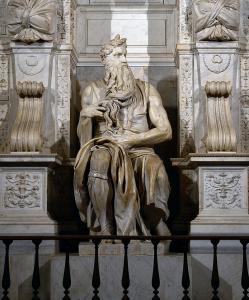 There is something deeply incongruous about the portrait of God presented to us in the book of Exodus. On the one hand, God is mightily overt, choosing Moses for the unenviable task of removing the people of Israel from the clutches of pharaoh, offering to him full support for the work, and finally providing ten increasingly powerful plagues that in the end persuade the Egyptian monarch to let the people go. One can hardly imagine a more direct picture of a God of potent action, a “God who acts,” in the famous phrase of 20th century Hebrew Bible scholar, G. Ernest Wright. Here is portrayed a God who can readily be known by what that God does in the literary history of the people of Israel. Please note that I said the “literary history,” not the actual history of Israel, unlike Wright and many of his students and colleagues who imagined that the Book of the Exodus somehow enshrined a sort of history that could be conjured from the sands of the ancient Near East. I disagree. There is little recoverable history in the book, despite the labors of Wright and others, but there is crucial literary history, leading to important theological reflections that nurtured the faith and life of Israel and Judaism for the following two and one-half millennia.
There is something deeply incongruous about the portrait of God presented to us in the book of Exodus. On the one hand, God is mightily overt, choosing Moses for the unenviable task of removing the people of Israel from the clutches of pharaoh, offering to him full support for the work, and finally providing ten increasingly powerful plagues that in the end persuade the Egyptian monarch to let the people go. One can hardly imagine a more direct picture of a God of potent action, a “God who acts,” in the famous phrase of 20th century Hebrew Bible scholar, G. Ernest Wright. Here is portrayed a God who can readily be known by what that God does in the literary history of the people of Israel. Please note that I said the “literary history,” not the actual history of Israel, unlike Wright and many of his students and colleagues who imagined that the Book of the Exodus somehow enshrined a sort of history that could be conjured from the sands of the ancient Near East. I disagree. There is little recoverable history in the book, despite the labors of Wright and others, but there is crucial literary history, leading to important theological reflections that nurtured the faith and life of Israel and Judaism for the following two and one-half millennia.
It is theologically noteworthy that surrounding the action-packed divine portrayals found in Ex.4-32 are found two texts that rather more hide the reality of God (YHWH) than reveal that God. The first I have discussed in an earlier essay on Ex.3:1-14, that famous and unforgettable encounter at the ever-burning bush. I tried to suggest in that piece that the so-called revelation of YHWH to Moses from the bush—that infamous “I am who I am”—is as much an obscuring of God than any sort of actual revelation. Moses demands the name of God out of a fear that if he does not possess God’s name, no one will believe that he has actually been called by that God when he returns to Egypt to begin the extrication of his people from slavery. How could he possibly convince the people to follow him if he cannot even name the God who promises their freedom? After all, in the Hebrew Bible to have the name of a person is to have a certain sort of control over that person; the ability to call the name out loud is to conjure the essence of the person, to allow the hearers to picture the person, to call them to consciousness, to make them real and tangible and present. Consider the memorable names of Abram, the “mighty father” of Israel; Isaac, the child of “laughter;” Jacob, the “grabber/taker/trickster” of Israel; even Moses himself, the one “drawn out” of the Nile (though his name is at the same time very like that of several famous Egyptian pharaohs—Ra-Moses, Tut-Moses, the name “Moses” meaning “son of” in their language).
But when Moses demands of the bush the name of the God who apparently speaks to him from among the fiery leaves, the reply is distinctly odd. “I am who I am” means in effect “A=A,” a valuable world reality, perhaps, but a formula with little actual content. The peculiar formulation is surely related to the name YHWH, built somehow in Hebrew from the verb “to be.” But to say that a name is “I am” is hardly to reveal very much about who this God in fact is and what one can expect the “I am” to do. The fact that the revelation of the name is less than satisfactory is proven by Moses’s subsequent demand for magic tricks in order to prove that he has the reality of God at his back, whining to the bush “suppose they do not believe me and say, ‘YHWH did not appear to you’” (Ex.4:1)? Then it is that YHWH offers Moses three clever tricks of staff, hand, and water, indicating that the revelation of the name of God has plainly not been sufficient to convince the chosen one to perform the required task. “I am who I am” will not cut it as revelation enough to send Moses on his way back to Egypt. It is in effect an obscuring of YHWH and not much of a revelation of who YHWH is at all. Moses, of course, finally goes, but that “I am” business was not the impetus for his going.
In today’s text of Ex.33, after all the grand happenings of Egyptian escape, the wonders of the wilderness of quail and manna, the gift of the Torah at Sinai, the intercessory actions of Moses to save Israel from the depredations of Aaron and his disgusting molten calf, Moses again seeks more knowledge of the God who has called. Here we witness the Moses I call “cheeky;” he has done all that YHWH has called him to do, and so he now expects a fuller revelation of that God as an appropriate reward for his laudable and dangerous actions at God’s behest. “Now if I have found favor in your eyes, show me your ways (that is, “how you act”) so that I may find favor in your eyes” (Ex.33:13). This is a most peculiar formulation of Moses’s request. “If I have found favor, tell me how you act so that I can find favor.” Perhaps it could be paraphrased as follows: “My success has suggested that you favor me, but if I am to have real divine favor, I must have deeper insight into your behaviors as God.” All that earlier stuff was fine, those acts of power on our behalf, but I need more, God; I need to see how you act, not merely the acts themselves.
But Moses does not stop there. He goes on to demand that God continue to go with them in their dangerous trip to the land of promise. If God will not go with them, again Moses indicates that he “will not find favor in your eyes” (Ex.33:16). This constant request to find favor appears to be a continual need for overt and certain proof that God really has chosen Moses and Israel for a distinctive task, and half-hearted and bizarre so- called revelations of the divine name will not do it. But God responds quite positively to Moses’s cheeky demands, saying, “I will do the very thing you have asked” (Ex.33:17). But we note that Moses has asked more than one thing: show me your ways; go with us; demonstrate that I have found your favor. Which question will God answer? How will YHWH answer “the very thing you have asked?” Despite the ambiguous divine reply, Moses receives it as an entrée to further probing of the divine essence.
“Show me your glory,” shouts Moses (EX.33:18). The word “glory” is a rich one in Hebrew. Its basic meaning is “heaviness” or perhaps “substantial.” In this context it seems to imply the very being of God, the clear essence of who YHWH is. A cheeky Mosaic question indeed! And YHWH’s reply is obscure in the extreme. “I will make all my good (common Hebrew tob) pass before you, and will proclaim to you the name, YHWH” (Ex.33:19). And so we are back to the divine dodge at the bush. You want a name? Here it is, as obscure and unfathomable as always. “You cannot see my face,” continues YHWH, but “stand on this rock, while my glory passes by” (Ex.33:21-22). Yet, while that glory is on display, YHWH “covers Moses with the divine hand until I have passed by; then I will remove my hand, and you shall see my back” (my “after” more literally Ex.33:21-23). Moses asks for God’s “glory,” but instead while the glory is passing in review, Moses is rendered unable to see it, and is merely given a glimpse of God’s “after” (wake? train? residue of the acts of God?). The whole scene is clouded in strange and peculiar actions and language, at the end of which we know very little more of this God than we knew before, only that God is mightily reluctant to reveal much of the true essence of Godself.
Why is all this so unclear? Why does God not come clean with Moses and show him God’s glory, God’s true self? If there is an answer, it must be found in the necessity of divine obscurity. If Moses or we actually knew all there was to know about God, we would in effect have a kind of control over the one we worship, and that control would serve as a sort of diminishing of God, a whittling down to size of the one we need to be beyond our control and full understanding. It is, I think, essential that our God not be too small, too well known, too easily grasped. Though God is in many ways the sum total of who we creatures all are, as the panentheists have it, there remains a part of God unreachable by us, unknowable by us, unavailable to us. There is a necessary obscurity in God, without which God becomes too familiar, too recognizable, too easily grasped and held.
I have often said that we all should observe a period of time when we cease saying the name of God. God has become trivial to many, the very fear that the third commandment (or the second depending on your counting) warned against. The NRSV’s translation of a “wrongful use of the name of YHWH your God” is not so much a mistake as it is too limited. The word used can mean “trivial,” and that gets at the problem. We abuse God’s name by employing it for nothing: “God, it’s hot,” or “God bless America” (as opposed to other nations), or “God damn it,” after an errant golf shot.” Such a god is no real God, not the God of Moses and Israel, not a God worthy of any awe and worship. The obscurant God of Exodus is the God we need, a God we cannot fully fathom, cannot completely understand. The cheeky Moses learned that, and so must we in our time of global pandemic and a serious reckoning with the deep divisions we have created in our country and in the world. We desperately need a God who is
beyond us, yet who stays with us as we strive to survive in a world that seems so often to be descending into chaos.
(Images from Wikimedia Commons)











